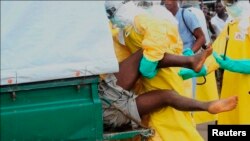We are now six months into the worst Ebola epidemic in history, warns the medical aid group Doctors Without Borders, and the world is losing the battle to contain the spread of the deadly Ebola virus.
Doctors Without Borders is an international movement of medical and humanitarian organizations collectively known as Medecins sans Frontieres (MSF). MSF has been in the forefront of the battle against the Ebola virus that has infected more than 3,700 people and killed an estimated 1,900 people in four West African countries.
MSF international president Dr. Joanne Liu told a South Afrrican audience recently that the world’s leaders are “failing to come to grips with the global threat of the virus.” MSF has been raising the alarm bell, she said, “but the response has been too little, too late. “
“The outbreak began six months ago, but was only declared a public health emergency of international concern on August 8,” said Liu.
Speaking for MSF, James Kambaki in Johannesburg tells VOA, “I think the situation is catastrophic. It’s really bad because we have still a high increase of cases, at the same time increases of death, and it’s still spreading.”.
Local health systems are failing
Health systems in Guinea, Sierra Leone and Liberia have been ill-equipped to manage the mounting load in the contagion, to isolate and treat infected patients and to isolate people who have been in contact with those with confirmed infections.
“Families are broken down,” says Kambaki. “The health infrastructure is completely collapsed. The ordinary care that regular people should be getting is not there because people fear to go to the hospital.”
Isolation wards are over-whelmed causing patients who need intensive care to be turned away. Growing numbers of the dead present more problems of public health. Kambaki says, “We are made now to build crematoriams instead of more wards that are required.”
In her speech, Dr. Liu identifiied specific criteria to curb the Ebola epidemic; a humanitarian response that embraces leadership at the local, regional, national and international levels.
Not enough isolation wards
“I think the first thing that needs to be done is, we need to set up more isolation wards,” Kambaki says. “ We need to scale it up. We need to put them in all hot points where patients come into a country, because we still have about a 23 percent recovery rate from those isolation wards.”
Kambaki emphasized the need for more mobile laboratories that will diagnose Ebola cases and treat confirmed cases.
“And then we need to open up the regions because I think most governments have cancelled their flights—airplanes have stopped going to those countries,” he says. “Many countries are closing up their borders. We need to open up those things so it can actually aid deployment of more support to those particular countries.”
Kambaki argues for development of a regional network of field hospitals to treat health workers and other hospital staff who become infected with the virus. More than 120 health workers have died while trying to serve Ebola patients.
“We also have personnel who have been infected and they need care,” Kambak says.




